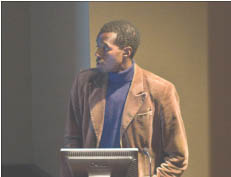
By Kate Jenkins
Correspondent
The College’s annual International Film Festival kicked off last Tuesday Sept. 21 in the Library Auditorium with the Senegalese feminist film “Moolaadé.”
Each film in the five-part festival is aimed at engaging students in the particular language of that film during a post-screening discussion session. Professors from the College either fluent in the language or knowledgeable in the film’s subject matter lead these sessions. With the exception of “Moolaadé,” all selected movies come from countries where languages taught on campus are spoken.
The two speakers chosen for the “Moolaadé” screening were Moussa Sow, professor of modern languages and African-American studies, and Marla Jaksch, professor of women and gender studies.
Sow cited director of “Moolaadé,” Ousmane Sembene, as a driving force for the film’s selection. According to Sow, Sembène is “considered to be the father of African cinema.”
“The film is about the touchy issue of female circumcision,” Sow said. He also said that Sembène had made a habit of tackling women’s issues in Africa, earning him a reputation as a feminist filmmaker.
“Moolaadé” took place in a modern African village that still practiced female circumcision, and the time had come to circumcise the girls living there. Six girls were taken into the forest to undergo the procedure, but all escaped before the cutting could begin. Four girls found the home of Colle Ardo and asked that she grant them “moolaadé,” or magical protection. Ardo’s compliance with their request started a bitter war in her small village between the men who supported female circumcision and the women who wanted to ban it.
“For (Sembène) this film is important because it is a story of Africa by Africans,” Sow said.
Jaksch acted as a discussant on the topic of female circumcision in the discussion session following the screening. During the session Jaksch shared with the audience more information about female circumcision and how it is being dealt with in Africa.
The proper term to use in reference to the procedure is under constant contention. Female genital mutilation is said to be an unfair judgment from the Western world, suggesting that most Americans view Africa as backwards and an uncivilized continent prone to animalistic tendencies.
Female circumcision, on the other hand, is a more accepting term. The practice is a long-standing tradition in Africa and the Middle East, and some think that first-world attitudes should not dictate what is right and what is wrong in other countries. “Moolaadé” confronted the controversial issue of FGM, or female circumcision.
The next installment of the film festival will take place Tuesday Oct. 5 at 7 p.m. in the Library Auditorium. The German film “Goodbye Lenin” will be shown and discussed.






